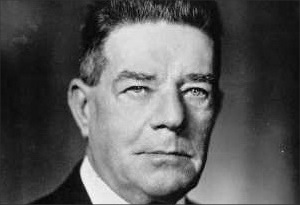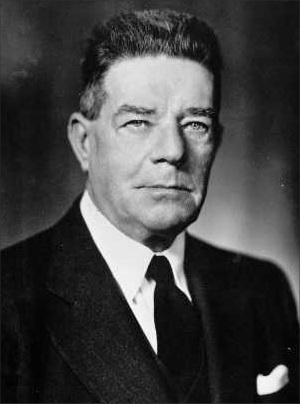 Publisher's note: We believe the subject of history makes people (i.e., American people) smarter, so in our quest to educate others, we will provide excerpts from the North Carolina History Project, an online publication of the John Locke Foundation. This seventy-first installment, was originally posted, by Jonathan Martin, in the North Carolina History Project.
Publisher's note: We believe the subject of history makes people (i.e., American people) smarter, so in our quest to educate others, we will provide excerpts from the North Carolina History Project, an online publication of the John Locke Foundation. This seventy-first installment, was originally posted, by Jonathan Martin, in the North Carolina History Project.
Lindsay Warren of Washington, NC
Hailing from Washington, North Carolina, Lindsay Warren was a long-serving Democratic politician. He served eight terms in the U.S. House of Representatives and led the U.S. General Accounting Office (now the Government Accountability Office) for more than a decade.
A native of coastal North Carolina, Warren attended the Bingham School, a military academy in Asheville. He later matriculated at the University of North Carolina and earned an undergraduate degree in 1908 and a law degree in 1912. After graduation from law school, he began a political career: he chaired the Beaufort County Democratic committee from 1912 to 1925. In 1917, he was elected to the North Carolina Senate, where he quickly made a reputation as a Democratic leader.
When in 1920 the North Carolina General Assembly considered ratifying the Nineteenth Amendment to the U.S. Constitution, which granted women the vote, Warren emerged as a leading opponent and contributed greatly to the state Senate rejection of the amendment. North Carolina's role became immaterial, when the state of Tennessee ratified the amendment and provided the necessary ratifying conventions to turn the amendment into law. North Carolina ratified the amendment in 1971.
In 1924, Warren was elected to the U.S. House of Representatives. Republican majorities, which persisted until 1931, delayed his rise to prominence in the U.S. Congress. By the mid-1930s, however, with the New Deal underway, Warren had become one of the leading Southern politicians in the House. Although in many ways a Progressive, Warren was in some ways an anti-Progressive. First, he opposed President Franklin D. Roosevelt's attempt to pack the Supreme Court. Second, he was a staunch segregationist. In 1934, the restaurant of the U.S. House of Representatives refused to serve two African-Americans, prompting a public debate about segregation in Federal facilities. Warren's contribution to the debate was to assert: "The restaurant has never served negro employees or visitors, nor will it so long as I have anything to do with it."
Warren was nonetheless effective at manipulating New Deal programs, and he exerted a particularly profound influence on New Deal agriculture policy. The terms of the Agricultural Adjustment Act and subsidies administered by the Agricultural Adjustment Administration (AAA) generated incentives for many farmers to grow crops outside of AAA contracts. One of the goals of the act had been to raise crop prices and thereby assist farmers. Noncontract crops, however, lowered prices. Potatoes were especially problematic, with noncontract potatoes hurting many North Carolina farmers. To alleviate this problem, Warren sponsored a potato bill voted into law in 1935. The Warren Potato Control Act levied an onerous tax on noncontract potatoes, driving noncontract farmers out of the market.
Warren briefly rose to majority leader but ended his House career in 1940 to head the General Accounting Office (GAO)--he led it until 1954. When he assumed leadership of the GAO, the office had not been up to the task of monitoring the U.S. government's finances. Among many lapses, it never audited the balance sheets of U.S. government corporations, and it made little effort to examine war contracts. Warren sought to remedy these deficiencies, imposing strict accounting guidelines and hiring professional accountants who had worked in the private sector. During the last decade of Warren's tenure, the GAO's own payroll shrank as the organization became measurably more effective.
After his retirement from the GAO in 1954, Warren returned to North Carolina. Though he had intended to live quietly on the Outer Banks, he was again elected to the state Senate in 1959. During his last term in the Senate, his reputation and accomplishments lent him gravitas, and he was widely considered the most influential member of the General Assembly.
He retired from public life due to poor health in the mid-1960s. He died in 1976.
Sources:
Tom Belton, "North Carolina Equal Suffrage Association," in Encyclopedia of North Carolina, ed. William S. Powell (Chapel Hill, 2006); W. Lee Johnston, "Warren, Lindsay Carter," in Dictionary of North Carolina Biography, ed. William S. Powell (Chapel Hill, 1996); William Edward Leuchtenberg, The White House Looks South (Baton Rouge, 2005); James Stuart Olson, "Warren Potato Control Act of 1935," in Historical Dictionary of the Great Depression (Westport, Connecticut, 2001).

